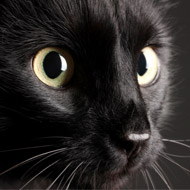
Pet owners urged to look beyond coat colour
On Black Cat Appreciation Day (17 August), the RSPCA is urging people to look beyond an animal’s appearance and understand that coat colour makes no difference to how much love they have to give.
RSPCA cat behaviour and welfare expert Sam Watson said: “All cats are individuals with their own quirks and personality, so I recommend people try to look beyond their colour to find the right match for them.
“At the RSPCA we care for all animals and believe each one deserves a second chance at happiness. If anyone is looking to become a cat owner we would urge them to adopt a rescue cat as there are so many that need loving homes.”
Rehoming figures published by the RSPCA show that black and black and white cats are seen more often in their centres than any other colour. Black cats are also most overlooked, taking on average 30 days to find a new home, compared to an average of 19 days for ginger cats.
The charity believes it could be because black cats are more common, but also that ginger and tabby cats are seen as more unusual or different.



 The Animal and Plant Health Agency (APHA) has updated its online reporting service for dead wild birds.
The Animal and Plant Health Agency (APHA) has updated its online reporting service for dead wild birds.